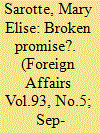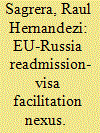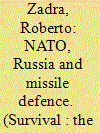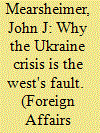| Srl | Item |
| 1 |
ID:
133666


|
|
|
|
|
| Publication |
2014.
|
| Summary/Abstract |
Moscow has long argued that in expanding NATO eastward, Washington broke the promise it made to Soviet leaders shortly after the Berlin wall fell. But new evidence shows that the United States never actually made such a pledge.
|
|
|
|
|
|
|
|
|
|
|
|
|
|
|
|
| 2 |
ID:
092150


|
|
|
|
|
| Publication |
2009.
|
| Summary/Abstract |
The European Union (EU) and Russia's'shared neighbourhood' of Ukraine, Moldova, Belarus, Armenia, Azerbaijan and Georgia was, according to Lowenhardt, writing in 2005, 'an economic and diplomatic battlefield' (Lowenhardt 2005) The period that has followed has seen this agenda develop into a mainstream political debate on the prospects for European security and spill over into the military domain with the conflict in South Ossetia in August 2008. This conflict and the Ukrainian energy crisis in January 2009 have contributed to the generation of a new post-Cold War low point in EU-Russia relations.
|
|
|
|
|
|
|
|
|
|
|
|
|
|
|
|
| 3 |
ID:
100925


|
|
|
|
|
| Publication |
2010.
|
| Summary/Abstract |
Despite the lack of cooperation in other issue areas, EU-Russia migration cooperation has been fruitful to the present. The internal security driven EU migration policy towards third countries has so far led to the conclusion of readmission and visa facilitation agreements as policy outputs in Russia. This article looks at the patterns of policy convergence between the EU and Russia in light of the Common Space of Freedom, Security and Justice in the fields of irregular and regular migration. It claims that Russia's leverage vis--vis the Union shaped the migration policy output, in which the visa facilitation regime was introduced as an incentive to readmission. Finally, it stresses the role of Russia in shaping the EU external dimension towards Eastern European countries, once the readmission-visa facilitation nexus has been institutionalised to all the countries in the area.
|
|
|
|
|
|
|
|
|
|
|
|
|
|
|
|
| 4 |
ID:
138481


|
|
|
|
|
| Summary/Abstract |
AFTER THE ESTABLISHMENT in 1955 of diplomatic relations between the Soviet Union and what was then West Germany, Russia and Germany have accumulated an impressive reserve of confidence and traversed a difficult historic path of conciliation between them. Despite turbulent times, Moscow and Berlin for a long time gravitated towards each other and valued this. Relations between the two countries' leaderships were developing rapidly on the basis of bilateral documents and there were strengthening ties in economy, trade, energy, education, science, arts, and environmental protection. There were increasingly frequent youth exchanges and there were indications that the civil societies of Russia and Germany were drawing closer together in practical terms. Russian and German politicians, public figures, and civil society activists constantly stressed the unique character of Russian-German partnership, which became an important factor of peace and stability in Europe. Diversified cooperation between the two countries became a vivid example of good-neighborly relations between two European nations
|
|
|
|
|
|
|
|
|
|
|
|
|
|
|
|
| 5 |
ID:
100926


|
|
|
|
|
| Publication |
2010.
|
| Summary/Abstract |
This article provides a comprehensive analysis of EU-Russia energy relations in the light of the concept of energy security. It gives a brief overview of various views on the concept of energy security. Further, the article compares developments in EU and Russian internal energy markets and their influence on the external energy policy of both actors. It concludes that predictability might be achieved only in a regulatory framework that aggregates the interests of all stakeholders and ensures a fair distribution of risks, obligations and revenues.
|
|
|
|
|
|
|
|
|
|
|
|
|
|
|
|
| 6 |
ID:
132467


|
|
|
|
|
| Publication |
2014.
|
| Summary/Abstract |
Talks on NATO-Russia missile-defence cooperation were suspended in April during the crisis over Crimea. In retrospect, the window for a real breakthrough had closed some 18 months earlier.
After three and a half years of difficult discussions, the project exploring NATO-Russia missile-defence cooperation is not only suspended, but has probably reached its end. The initiative was an attempt to overcome Cold War thinking and realise the vision of the 2010 NATO-Russia Council Lisbon Summit: a 'true strategic and modernised partnership', and 'a common space of peace, security and stability in the Euro-Atlantic area'.
|
|
|
|
|
|
|
|
|
|
|
|
|
|
|
|
| 7 |
ID:
114177


|
|
|
|
|
| Publication |
2012.
|
| Summary/Abstract |
The discourse on EU-Russia relations amongst practitioners, think-tank experts, journalists and academics has congealed around a postmodern-modern binary. It is frequently argued that whereas Russia is caught up in a 'modern' framework of fixed territory, national identity and traditional geopolitics, the European Union is driven by a 'postmodern' spatial mindset that transcends these 'backward' values. This article argues that the EU's supposed postmodern geopolitics remains enmeshed in a very modern temporality-a consciousness of time that valorises the present over the past. It also detects a problematic disillusion with the postmodern and questions its implicit normativity.
|
|
|
|
|
|
|
|
|
|
|
|
|
|
|
|
| 8 |
ID:
133665


|
|
|
|
|
| Publication |
2014.
|
| Summary/Abstract |
Conventional wisdom in the West blames the Ukraine crisis on Russian aggression. But this account is wrong: Washington and its European allies actually share most of the responsibility, having spent decades pushing east into Russia's natural sphere of interest.
|
|
|
|
|
|
|
|
|
|
|
|
|
|
|
|